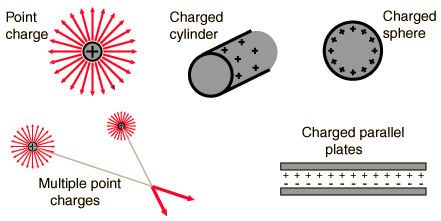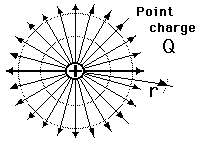Electric Field
Electric field is defined as the electric force per unit charge. The direction of the field is taken to be the direction of the force it would exert on a positive test charge. The electric field is radially outward from a positive charge and radially in toward a negative point charge.

| Using Gauss' law for electric field calculation |
Electric field concepts
Electromagnetic force
| HyperPhysics***** Electricity and Magnetism | R Nave |


 and the magnetic permeability of free space,
and the magnetic permeability of free space,  . The magnetic permeability of free space is taken to have the exact value
. The magnetic permeability of free space is taken to have the exact value


